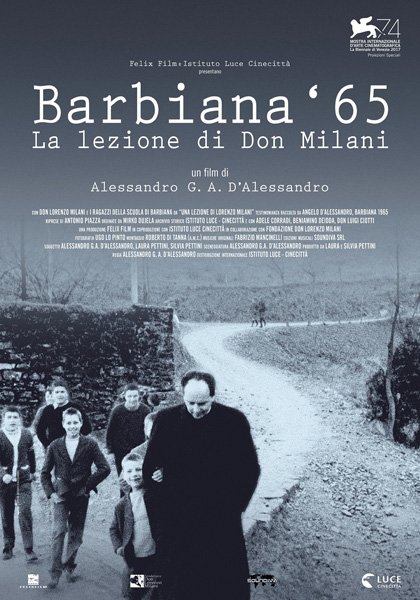File:2017 D'Alessandro (doc).jpg
2017_D'Alessandro_(doc).jpg (420 × 600 pixels, file size: 61 KB, MIME type: image/jpeg)
{en} Barbiana '65: La lezione di Don Milani [1] (Italy, 2017), directed by Alessandro G.A. D'Alessandro. <doc>
Barbiana, December 1965. The Director Angelo D'Alessandro goes to Mugello, in Tuscany, to Don Milani, for an inquiry into conscientious objection. The meeting with Don Lorenzo and the boys from the Barbiana school was to change his goals. Angelo D'Alessandro "collects a unique testimony", shared by Don Lorenzo himself, who narrates, speaks, and elucidates. BARBIANA '65 - The Lesson of Don Milani was born out of the retrieval of the material shot by Angelo D'Alessandro, the only filmmaker Don Lorenzo ever allowed to film the daily life of his school. The images of 1965 show us who were Don Milani's first students. His school focusses above all on those most disadvantaged, the children of the workers and those without material means. Don Lorenzo's purpose is clear, to make his students into true citizens, men capable of getting to the bottom of things, a reason with their own minds. The original film footage shows some moments and aspects which are fundamental to the Barbiana School: the collective writing, the reading of the newspapers, the older boys who teach the younger ones. But there is also the manual work performed by the boys. And in the midst of them, Don Lorenzo, discussing, explaining, questioning the boys, and himself included. Because now that he is in front of the camera, there are questions that regard him too. Around these images of 1965, there develops the story with the testimonies of Adele Corradi, the teacher who lived the experience of Barbiana with Don Lorenzo, of Beniamino Deidda, former Procuratore Generale of Florence, who after the death of Don Lorenzo, continued to teach the boys of the Barbiana school, and Don Luigi Ciotti. School, Constitution and Gospel are the three pillars on which the Milanian philosophy is developed, which finds its culmination in the reading which Don Lorenzo gives before the camera, of his letter to the Judges, the text written as defense against the charges of Apology for crimes, in the trial that awaits him in Rome. The film therefore gives back to us with great force, the voice and image of man, who today, more than ever rep-launches the theme of conscience and obedience, of justice and solidarity, of a school whose aim is that each student should become sovereign of himself.
File history
Click on a date/time to view the file as it appeared at that time.
| Date/Time | Thumbnail | Dimensions | User | Comment | |
|---|---|---|---|---|---|
| current | 08:43, 27 May 2023 |  | 420 × 600 (61 KB) | Gabriele Boccaccini (talk | contribs) |
You cannot overwrite this file.
File usage
The following page uses this file:
- File:2017 D'Alessandro (TV miniseries).jpg (file redirect)
